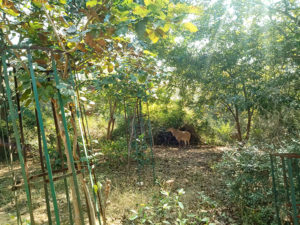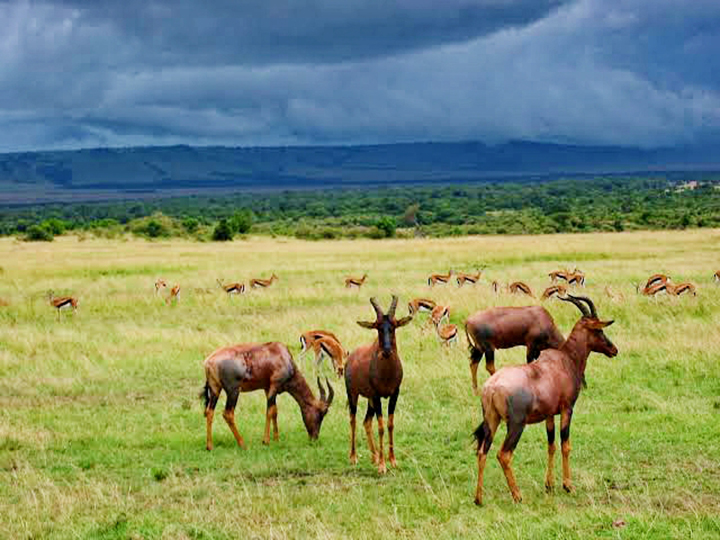The killing of wildlife for meat by tribals, poachers and even forest officials during the lockdown has raised the threat of zoonotic diseases. This is despite the ban in place in India and the horrific consequences of Covid-19 infection via Wuhan’s wet market
Dipu Rana, a forest guard, was unarmed when he got the information about the illegal cutting of bamboos on 4 May. Along with two other forest guards, he went to check Mohna area south of Ghatigaon beat. He didn’t find anything, but while returning he met Ramkishan Mongia who had allegedly come to hunt a hawk.
When Rana tried to apprehend him, Ramkishan allegedly shot him. He was rushed to the local hospital where he was declared dead. The suspect belongs to the traditional Mongia hunting tribe of Madhya Pradesh. During the lockdown, the craving for game meat led to his trip to the forest, officials said.
The Mongia tribe is infamous for poaching, not only in Madhya Pradesh but also in Rajasthan. The main reason attributed to this pattern of behaviour is poverty and lack of alternative sources of income as tourist dried up. The lockdown exacerbated the already bad state of the community.
This is not a lone incident of poaching for bush meat during lockdown. On 24 April, four forest officials — all residents of Gwalior region — were arrested for allegedly poaching blue bull, chinkara and peacock. Also, a crocodile was killed in Betwa river coming under Orchha wildlife sanctuary and a blue bull was reportedly killed in Bhopal.
Speaking with Patriot, a forest officer in Madhya Pradesh on anonymity said, “During lockdown, the availability of mutton and fish has been affected, and that is causing the illegal hunting for bush meat. Taking advantage of lockdown, not just people from primitive tribes but other hoodlums are sneaking in the protected areas to hunt chinkara, wild boar, nilgai. But I believe even during normal conditions poachers do sneak into forests — a lot of wildlife is killed and traded.”

Poaching for bushmeat is not just happening in MP but is a country-wide phenomenon. Cases of seizure of bush meat and poaching have been reported from various forest-rich states including Assam, Karnataka, Maharashtra, Madhya Pradesh, Rajasthan and Uttarakhand. Though there is no study implying that the lockdown increased the cases of wildlife being killed, there is enough anecdotal evidence of poaching for bushmeat.
Since tourist traffic is shut off, animals in the forest, owing to less noise pollution, are enjoying greater freedom. Wildlife experts believe lack of tourism is affecting the conservation efforts. Tiger conservationist Latika Nath said that conservation is supported by tourism and lack of it is affecting the conservation efforts. “We have seen an increase in the number of poaching cases for bush meat.” She added, “Another problem is that the money available for conservation is being directed to fight Covid-19.”
A 2017 study led by conservation biologist Raghu Singh Chundawat, titled ‘The value of wildlife tourism for conservation and community’ on four tiger reserves in Madhya Pradesh — Kanha, Panna, Bandavgarh and Pench — says that tourism garnered Rs 166 crore annual revenue and half of it was invested back in the local economy, generating employment for camp staff, guides, jeep drivers and small businesses. Most importantly, it gives employment to hunting tribes.
The 13 months before the lockdown were good for the one-horned rhino, as there was no poaching detected in Kaziranga National Park. But during this lockdown, that record was broken as in eastern range Agoratoli, eight rounds of empty AK-47 cartridges were recovered, along with a carcass. The horn was missing. On 10 May, four men were apprehended in Similipal tiger reserve Odisha with the skin of a leopard.
In Kathanviduthi village of Tamil Nadu’s Pudukottai district, three were arrested for killing and eating monitor lizards. Around 135 cases were registered for poaching big cats in the state. Other southern states like Karnataka and Kerala also reported a rise in the number of cases.
In a report by the global wildlife trade network TRAFFIC, it was mentioned that poaching amid lockdown has increased 151%. It compared the instances of poaching (as per media reports) during the six weeks before lockdown period (10 February to 22 March), which is the baseline, with six weeks of lockdown (23 March to 3 May). The highest jump in poaching cases was reported of ungulates.
Dr Saket Badola, head of TRAFFIC’s India Office said in a press release, “The more than doubling of reported poaching cases, mainly of ungulates and small wild animals for meat is no doubt placing additional burdens on wildlife law enforcement agencies. Therefore, it is imperative that these agencies are supported adequately and in a timely manner so they can control the situation”.
Pandemic link
Marie Quinney, Specialist, Nature Action Agenda, World Economic Forum writes on the website, “60 percent of infectious diseases originate from animals and 70 percent emerging infectious diseases are sourced to wildlife. AIDS, for example, came from chimpanzees, and though the source of SARS is still unknown but it is thought to be transmitted from animals. We have lost 60 percent of wildlife in the last 50 years while the number of new infectious diseases has quadrupled in the last 60 years.”
“Natural habitats are being reduced, causing species to live in closer quarters than ever to one another and to humans. As some people opt to invade forests and wild landscapes due to business interests and others at the other end of the socioeconomic spectrum are forced to search for resources for survival, we damage the ecosystems, risking that viruses from animals find new hosts – us,” she writes.
The Covid-19 proved how fast an infectious disease can travel and cause destruction. Large markets for bushmeat in countries like China and Vietnam and killing of wildlife for meat in various tropical countries poses high risk of many other such outbreaks.
Professors Josef Settele along with four other scholars in an article for ‘The Intergovernmental Science-Policy Platform on Biodiversity and Ecosystem Services’ (IPBES) writes, “This may be only the beginning. Although animal-to-human diseases already cause an estimated 700,000 deaths each year, the potential for future pandemics are vast. As many as 1.7 million unidentified viruses of the type known to infect people are believed to still exist in mammals and water birds. Any one of these could be the next ‘Disease X’ – potentially even more disruptive and lethal than COVID-19.”
Experts are hoping for tourism to resume again to support the conservation efforts. The diversion of conservation funds to fight Covid-19 and the strict lockdown proved to be a toll on the wildlife conservation efforts. As the world is fighting a pandemic, it is pertinent to address the root cause — which is killing of wildlife — as most of these infectious diseases are zoonotic. After all, as the famous saying goes ‘prevention is better than cure’.
(Cover: Wildlife experts believe lack of tourism is affecting the conservation efforts // Credit: Wiki Commons)





